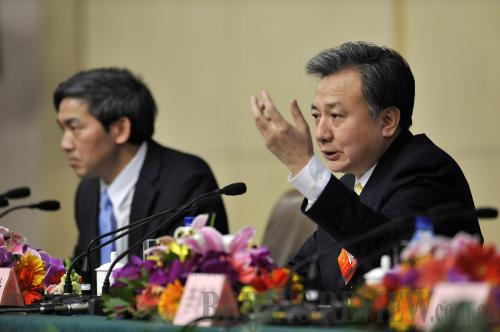|
 |
|
PRIORITY HIGHLIGHTED: Lang Sheng addresses anti-graft legislation at a press conference on March 8 (WANG PENG) |
Over the past decade, China has been instituting a variety of efforts to stamp out corruption, such as amending existing laws and creating new laws pertaining to civil servants and money laundering, and establishing the National Bureau of Corruption Prevention. However, the campaign to systematically address corruption is far from over.
Legal experts and lawmakers have called for drafting a more specific anti-graft law and enhancing the independence, professionalism and authority of supervisory bodies.
On March 8, at a press conference on the sidelines of the annual session of the National People's Congress (NPC), China's top legislature, Lang Sheng, Deputy Director of the Commission for Legislative Affairs of the NPC Standing Committee, said that improving anti-graft legislation to punish and prevent corruption will be a legislative priority over the next five years.
According to Lang, legislation to constrain the power of public officials and government bodies specifically addressing their organizations, functions, operational procedures and supervisory mechanisms will be put in place during that period.
Lang's announcement is the first mention of a timetable for a national anti-corruption law since the first motion on the issue was submitted to an NPC session 14 years ago. Zhang Zhongli, President of the Shanghai Academy of Social Sciences, submitted the historic motion in 1999. Similar motions and suggestions were also submitted to NPC sessions in 2002, 2005, 2010 and 2012, respectively.
Li Chengyan, head of Peking University's Clean Government Research Center, told newspaper Procuratorial Daily that there are several reasons for the extended wait. "With a transitional economy, the government has been busy solving problems hindering growth efficiency and lacked theoretical and practical preparation for drafting an anti-corruption law. Moreover, Confucianism emphasizes officials' personal moral standards over legislative imperatives. Political reform in China also falls behind other practices of reform and opening up," he said.
At this year's NPC session, a dominant view among deputies, especially those from the legal circle, was that China badly needs anti-corruption laws to create a sound legal environment.
"Anti-corruption campaigns should not be like harvesting leeks, which grow back soon after being cut off. We should focus on removing the roots and soil for corruption," said Zhang Zhao'an, an economist from Shanghai. His remarks were echoed by fellow deputies.
Su Zelin, Vice President of the Supreme People's Court, said that only laws and regulations can prevent officials of certain positions from falling into corruption.
Prosecutors have investigated approximately13,000 officials at the county head level or above for corruption and other duty-related crimes since 2008, including 30 officials at the ministerial level or higher, according to a work report delivered by Cao Jianming, Procurator General of the Supreme People's Procuratorate, to this year's NPC session.
Bo Xilai, a former member of the Political Bureau of the Communist Party of China (CPC) Central Committee, and Liu Zhijun, former Minister of Railways, were among the high-ranking officials investigated.
Ma Huaide, Vice President of the Beijing-based China University of Political Science and Law, is a long-time advocate for curbing corruption in China using laws and regulations. He has been invited to three expert seminars held by the CPC Central Commission for Discipline Inspection. Wang Qishan, head of the commission, hosted the most recent seminar last November.
Ma told The Beijing News that China still lacks several key laws to effectively contain power, which fall into three categories: basic laws curbing corruption at its origin, laws on strengthening supervision and those regulating the conduct of civil servants.
Ma said that the first category of laws includes a law governing procedures of government's administrative conduct, which could reduce the abuse of power by stipulating that any major government decision must go through the procedures of soliciting public opinions, consulting experts, assessing possible legal and other risks, and group discussion. Ma said that laws regulating the government's organizational setup should also fall under this category.
"China also needs to promulgate a law regulating the disclosure of government information, which has been proven internationally to be effective in fighting corruption," Ma said.
According to him, although the Regulations on the Disclosure of Government Information already came into force in 2008, there are still cases in which the government refused to reveal certain information with the excuse of maintaining "state secrets" or "classified documents." Ma believes a law is needed to prevent misuse of the Law on Guarding State Secrets and the Archives Law.
| 